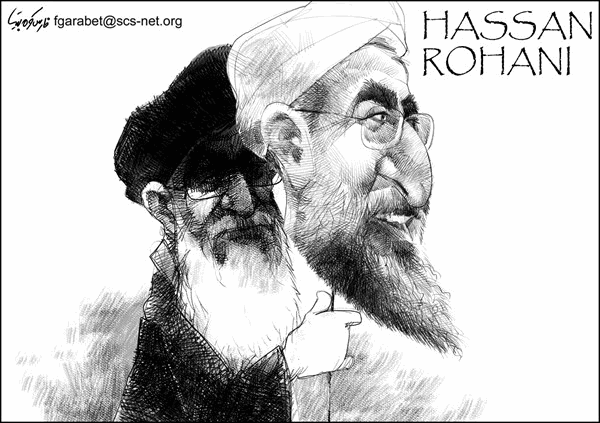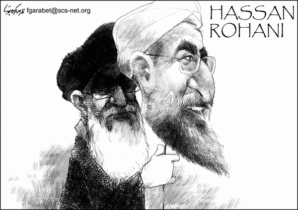
Today marks the first anniversary of Hassan Rouhani’s leadership in Iran. While he has proclaimed himself as a moderate, willing to take strides to open up relations between Iran and the Western world, his record to date tells a different story. Rouhani has accused the United States of backing the Taliban to create problems on Iran’s eastern borders, using the Taliban to give Islam a bad name, while attempting to gain control of oil resources in the region. By diverting attention to the United States, Rouhani has focused attention away from the issues festering in Iran.
The Iranian people continue to suffer economically and human rights are woefully ignored. Instead of creating stability in Iran, his presidency has been marked by continued insecurity for its people.
The human rights violations are the most troubling. A record number (at least 800 individuals including 16 women) were executed during his tenure, a significant surge compare to the same period for his predecessor. Political dissidents executed include Gholamreza Khosravi of the People’s Mojahedin Organization of Iran, the principal Iranian opposition movement. At least 44 individuals suffered public execution.
Scores of ethnic minorities, including Kurds and Baluchies, were among the execution victims. 52 Iranian dissidents at Camp Ashraf, Iraq, were massacred on September 1, 2013 by an Iraqi special security unit forces commanded by office of Iraqi Prime Minister, Nouri al Maliki at the behest of Iranian regime. These dissidents were all protected persons, under the fifth Geneva Convention, but the Iranian leadership flaunted these protections.
After Ahmed Shaheed, UN Special Representative for Iran Human Rights, cited numerous human rights violations in Iran, Rouhani stated, “The human rights issue has become a tool in the hands of the big powers to exert political pressure on certain countries.”
The human rights violations are not limited to the Iranian people. The regime has reached out under Rouhani’s leadership to incite terrorism and unrest in other Middle Eastern nations. Maryam Rajavi, the President-elect of the Iranian resistance, underscored that Tehran is the epicenter of all the sectarian conflicts and wars in the Middle East at a recent international conference in Paris.
Yet Rouhani blames the United States for these conflicts, claiming the Taliban “who know nothing about Islam, have been entrusted by Washington to tarnish the Moslem religion. The American officials’ and media’s silence on the latest developments in Afghanistan speaks volumes about United States backing for the Taliban.”
The mullahs’ regime is the main impediment to solving the crisis in Iraq. The eviction of the mullahs’ regime from Iraq is a prerequisite for any viable establishment of a democratic and inclusive government. “’The United States is responsible for the position in which the Iraqi people find themselves today,” said Rouhani, ignoring any contributions made by the Iranian mullahs.
While the finger pointing at the United States provides a distraction nationally, internal challenges continue to plaque Rouhani and Iran’s leadership, particularly those of an economic nature.
Economic hardships are being felt throughout Iran. Currently, 67 percent of industrial units are being shut down, increasing national unemployment. The official currency has plummeted by 80 percent nationwide. Water shortages are pervasive in the urban areas and agriculture been seriously damaged. Poverty is prevalent on a massive scale, as most citizens are forced to rely on subsidies equaling 42 cents a day.
Journalists attempting to expose the problems within Iran and the influence of the mullahs have met with stiff punishments. According to Journalists Without Borders, there are at least 65 journalists behind bars in Iran, including 10 female journalists. Yet Rouhani has stated, “Not one person is in prison in Iran except when there is a judgment by a judge following a trial.”
Censorship is not limited to journalists, but continues on the internet. Additionally, suppression of religious minorities targets Christians and Sunnis. About 50 percent of the government budget is spent on domestic repression and warmongering. This type of spending demonstrates the regime’s fear of popular protests and uprisings.
While stylistically Rouhani may appear reasonable and forthcoming, he is a consummate insider who has been at the pinnacle of power most of his life, sustaining extremist fundamentalist policies. Rouhani has served in multiple defense and governmental positions, while supporting chemical, nuclear and biological weapon development. He has openly admitted that as the Mullahs’ former chief nuclear negotiator, he deceived the west by pretending to have suspended the uranium enrichment while they instead did secretly continue to pursue their nuclear ambitions, a matter that was shamefully revealed during his presidential campaign. Now the recent rounds of talks with Mullas to reach a comprehensive accord in order to put an end to this long standing nuclear issue were not successful as the regime does not want to give up its fatal nuclear project.
The evidence is clear that Rouhani is actively advancing the mullahs’ agenda, both in Iran and surrounding nations. “Whether wanted or not, the Islamic Republic of Iran is shouldering the leadership of many communities of the world,” said Rouhani.
Oppression will continue while Rouhani and his suppressive fellow mullahs are in power. The Iranian people deserve a democratic government of their own working for their benefit, instead of suppressing them and do anything to stay in power.

